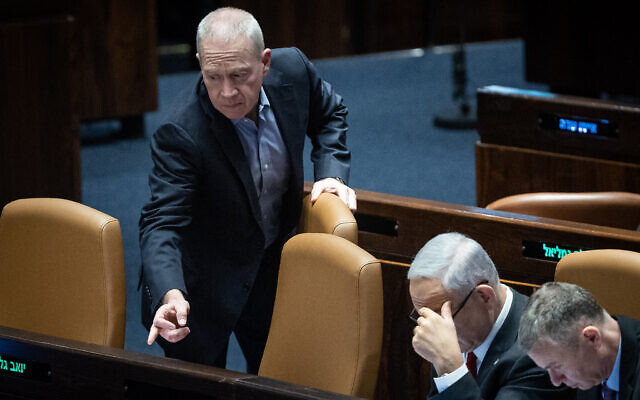Minister yet to receive official notice of termination; Shas chief Aryeh Deri reportedly working behind the scenes to convince Netanyahu to reverse decision
By ASH OBEL

Defense Minister Yoav Gallant (left) seen with Prime Minister Benjamin Netanyahu and Justice Minister Yariv Levin in the Knesset on February 15, 2023. (Yonatan Sindel/Flash90)
Defense Minister Yoav Gallant was still serving in his role on Tuesday, two days after Prime Minister Benjamin Netanyahu dismissed him for publicly urging a halt to the government’s judicial overhaul legislation.
Gallant addressed the nation with his recommendation on Saturday and was fired by Netanyahu in a statement Sunday. By Monday evening, Netanyahu, under intense public pressure, had halted the legislation as Gallant had sought. But he has not commented so far on Gallant’s future.
Hebrew media has reported on an ongoing coalition push behind the scenes for Netanyahu to reverse his decision. For now, the defense minister is fulfilling his duties, with no official notice of termination yet handed to him.
Gallant attended a planned security-related meeting at the Prime Minister’s Office in Jerusalem on Tuesday afternoon. The meeting was the first encounter between Netanyahu and Gallant since the defense minister’s Saturday night speech.
Channel 12 said the meeting ended without any small talk between them or direct discussion of the minister’s future.
The premier has reportedly held talks with Agriculture Minister Avi Dichter, a former Shin Bet chief who is seen as the favorite to replace Gallant if Netanyahu finalizes the decision to fire him.
In a speech delivered on Saturday, Gallant warned that the societal divisions exposed by the judicial overhaul “posed a clear, immediate, and tangible threat to the security of the state. I will not lend my hand to this.”
Less than 24 hours later, Netanyahu fired him, triggering a spontaneous mass national uprising of angry protesters who said the move was proof that Netanyahu was acting in self-interest and not with state security in mind.
Former government minister Aryeh Deri is said to be working behind the scenes to broker an agreement between Gallant and Netanyahu that would allow the former to continue in his role without sacrificing too much political capital, Channel 12 reported.
Leaving Gallant in his position would likely be opposed by some members of the coalition who advocated for Gallant’s dismissal, arguing that the defense minister’s decision to call for a legislative pause was a capitulation to military reservists who refused to serve until the judicial makeover was suspended.
Netanyahu is reported to have been incensed by Gallant’s decision to hold his press conference after previously telling Netanyahu he would wait on it, and without coordinating it with the premier.

Minister of Defense Yoav Gallant (left) and MK Yuli Edelstein arrive for a meeting of the Defense and Foreign Affairs Committee, in the Knesset on March 27, 2023. (Yonatan Sindel/Flash90 )
In a closed meeting of the Defense and Foreign Affairs committee on Monday, Gallant reportedly revealed intelligence information indicating that due to internal schisms over the now-paused overhaul, Israel’s regional security was at risk, particularly due to a potential weakening of US support, the Ynet news outlet reported.
“We are in a serious and unprecedented crisis,” Gallant was quoted as telling the committee.
Speaking after the meeting, committee chair MK Yuli Edelstein said he’d “heard worrying things” from Gallant. “Now is not the time to change defense ministers,” Edelstein added.
Gallant also received support from the opposition, with National Unity chair Benny Gantz urging Netanyahu to reconsider Gallant’s dismissal in a call on Monday night, according to a readout from Gantz’s office.
According to a Channel 12 poll from Monday night, 63 percent of respondents opposed the firing of Gallant. Among Likud voters, 58% opposed Gallant’s sacking, with 22% saying they supported the move.
After Netanyahu’s announcement on Monday that he was pausing the overhaul, Gallant said he welcomed the decision in order to hold talks with opponents of the legislation, his office said in a brief statement.
Questions raised over Benjamin Netanyahu’s control over coalition as he makes concessions to far right
Oliver Holmes and agencies
Israeli politics has descended into disarray with questions over whether a fired defence minister is refusing to step down and concerns Benjamin Netanyahu may have promised too much to far-right politicians in exchange for a deal aimed at quelling nationwide demonstrations.
Facing a climax in the 12-week protest movement against his plans to weaken the power of the courts, the prime minister on Monday evening announced a delay to the proposals, saying he wanted time to seek a compromise with political opponents.
In a televised address, 10 hours after he was initially scheduled to give a statement, a tired-looking Netanyahu said he was “not willing to tear the nation in half”.
The speech ended a tense day in which hospitals, universities, seaports and the international airport in effect shut down in protest at the judicial changes, which many see as a neutering of judges’ power to hold the government to account.
The crisis had at the weekend turned into near-chaos when Netanyahu dismissed his defence minister, Yoav Gallant, after he broke ranks by openly calling for a halt to the overhaul.
But while Netanyahu’s announcement has temporarily placated seething anger – the country’s main labour union called off the strike after his speech and Israeli streets were mostly quiet on Tuesday – it has by no means ended the crisis.
Already on Tuesday, questions were being raised over Netanyahu’s control over and credibility within his governing coalition, which includes a mixture of rightwing nationalists, religious leaders and far-right firebrands.
Aides to the fired defence minister said that despite his dismissal, Gallant would remain in his post. While the termination would have ordinarily gone into effect by Tuesday, Gallant’s aides said he had never been formally notified. Spokespeople for Netanyahu and his party, Likud, made no immediate comment.
Meanwhile, protest organisers have promised to continue to rally, accusing the prime minister of deception. Adding to their anxiety and that of the opposition, the ruling coalition on Tuesday tabled a final reading of a bill that would give Netanyahu, who is on trial on corruption charges he denies, greater control of the system for selecting judges.
While a parliamentary spokesperson called this a technicality, Netanyahu’s critics accused the prime minister of acting in bad faith and going back on his word. “A gun is being held to our heads,” tweeted the former finance minister Avigdor Lieberman.
To halt the crisis, Netanyahu has had to balance protesters’ demands with those of his far-right coalition partners, who argue that the courts have too much power. The 73-year-old leader only managed to pacify the national security minister, Itamar Ben-Gvir, the most ardent supporter of the judicial reform bill from the far-right Jewish Power party, by agreeing to the formation of a “national guard” under Ben-Gvir’s control.
While there were questions over whether Netanyahu had made an empty promise – he did not mention it in his major Monday speech and it would require several more steps to become established – critics decried plans for what they described as a militia.skip past newsletter promotion
“The prime minister has bribed the extreme right via a promise to create a militia that would endanger Israeli citizens – particularly the anti-coup protesters – as long as his government survives,” the left-leaning Haaretz newspaper wrote in an editorial.
It called on Israelis to “keep up the pressure on Netanyahu until he scraps the coup”.
“Experience shows,” the editorial said, “that Netanyahu resorts to manipulation, lies and scheming, and his second nature is to set traps that are discovered only when it’s too late.”
Reuters contributed to this report
The Israeli government consulted Poland over the judicial reforms that have sparked mass protests, says a Polish minister. Some of the protesters in Israel have explicitly declared they fear their country is following in Poland and Hungary’s footsteps.
“Of course, [when] speaking with Israel, we shared our experiences in this area to some extent,” deputy foreign minister Paweł Jabłoński told broadcaster RMF this morning when asked about the justice reforms and protests in Israel. “The Israeli side themselves asked us about it.”
When the interviewer suggested that that sounded like a joke, Jabłoński assured “I’m telling the honest truth, we talk about these issues”. He added that “Israel was interested in what happened in Poland and we’re interested in what’s happening in Israel”.
The minister noted, however, that “matters concerning the judiciary system are the internal affairs of every state”.
“If the majority in the Knesset [Israel’s parliament] decided that there is such a law, and now there are social protests, Israel will solve it itself, as it deems appropriate” he continued. “This is a democracy – just like any democracy, with various problems – but I am convinced that they will manage.”
Jabłoński’s comments came after some protesters in Israel expressed concern that their right-wing government, which came to power in November, is taking the country down a similar path as the national conservatives in power in Poland and Hungary.
Prime Minister Benjamin Netanyahu has in the past often enjoyed close relations with the ruling Law and Justice (PiS) party in Poland and Hungary’s Fidesz.
“There’s a danger that Israel will become like Hungary and Poland, and we are very concerned. We don’t want that to happen,” one protester, Menachem Katz, told US broadcaster NPR. Two other demonstrators, Dan Lahav and Maayan Aharon, expressed the same concern.
Hadas Aron, a political scientist at New York University, told NPR that Isreal’s government is indeed taking a page from the playbook of Poland and Hungary’s governments.
A correspondent in Tel Aviv for Polish TV station TVN, which is often critical of the Polish government, reports that crowds have been chanting “Israel is not Hungary, Israel is not Poland” during demonstrations.
Since coming to power in 2015, PiS has pursued a radical overhaul of the country’s justice system, triggering a number of mass protests.
Experts, international organisations and Polish opposition parties say that PiS’s policies have undermined the independence of the judiciary, the rule of law, and democracy itself. A majority of the Polish public view the reforms negatively and believe they are intended to exert political control over the courts.
Between 2010 and 2020, Poland moved further towards autocracy than any other country in the world, according to the V-Dem index compiled by academics and other experts. Other international reports and rankings have produced similar findings.
PiS, however, argues that its reforms – which have included bringing judicial appointments under greater political control – have been necessary to purge the influence of “post-communists” from the judiciary, to stop judges from being a self-governing “caste”, and to make the courts more efficient.
However, a survey in January this year found that less than 9% of people in Poland believe that the country’s courts function better now than they did before the current government came to power in 2015, while over half think they have got worse.
Even the PiS prime minister, Mateusz Morawiecki, has admitted that the overhaul of the judiciary has “not lived up to expectations”. His government has recently sought to roll back its new disciplinary system for judges in order to unlock EU funds frozen over rule-of-law concerns.
Main image credit: Lizzy Shaanan/Wikimedia Commons (under CC BY 2.5)



No comments:
Post a Comment